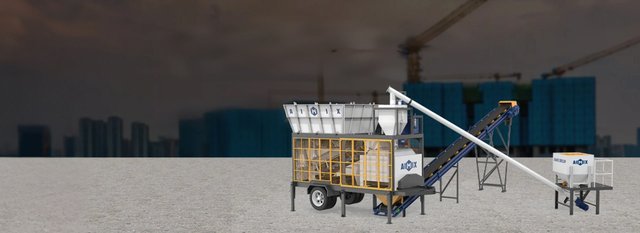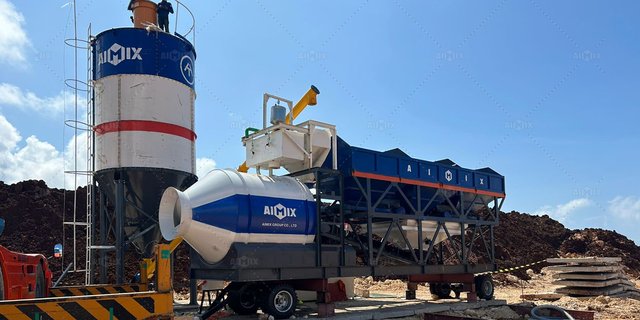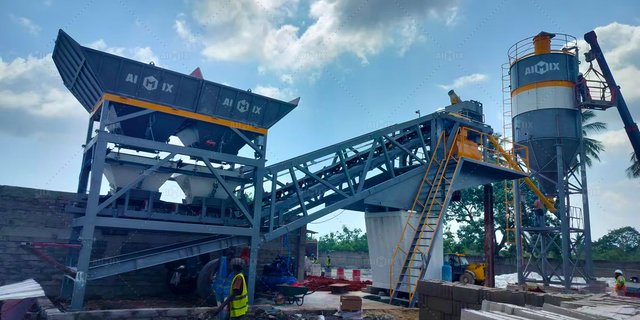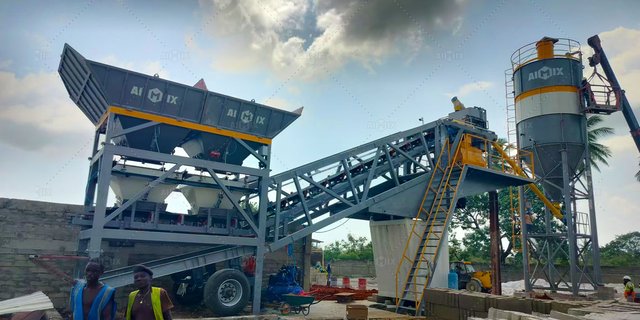Can a 25 m³/h Compact Batching Plant Support Concrete Demand for Small Bridges or Local Road Maintenance in Indonesia?
When working on small bridges or local road maintenance projects in Indonesia, many contractors wonder whether a compact batching plant with a capacity of 25 m³/h can meet the concrete demand. This question matters because choosing the right equipment directly affects cost, efficiency, and project timelines. In this post, I will explore the capacity of such a plant from the perspective of real construction needs in Indonesia and explain why it can be a practical solution.

Understanding the Capacity of a 25 m³/h Compact Batching Plant
A 25 m³/h batching plant means it can produce 25 cubic meters of concrete in one hour. On a standard working day of 8 hours, that equals around 200 cubic meters of ready-mix concrete. For projects like small bridges or local road patching, this production scale often matches the daily demand. Unlike large-scale highways or high-rise buildings, these smaller projects do not require continuous large-volume concrete supply. Therefore, the 25 m³/h plant offers a balanced option: it is compact enough to move and set up quickly, yet strong enough to provide consistent output.
Concrete Needs for Small Bridges and Local Road Maintenance
To evaluate suitability, we must compare capacity with actual concrete requirements. A small rural bridge may need 100–150 m³ of concrete for its deck and supporting structures. Local road maintenance jobs, such as patching or resurfacing short sections, may only need 50–100 m³ in a day. Clearly, these volumes fall well within the production ability of a 25 m³/h plant. This means contractors can complete daily targets without delays or reliance on third-party suppliers. Moreover, controlling your own production improves quality consistency, which is crucial in infrastructure durability.

Advantages of Using a Compact Batching Plant
Beyond capacity, contractors also consider mobility, cost, and setup time. A compact 25 m³/h plant offers several advantages:
1. Quick Setup and Easy Relocation
Small projects often occur in scattered locations across Indonesia. With a compact plant, you can transport it easily, set it up in limited space, and start producing without long delays. For example, using a mini batching plant concrete allows you to gain this flexibility instantly.
2. Lower Investment, Higher Flexibility
Compared with larger batching plants, a 25 m³/h model requires less investment. For contractors handling small to medium projects, this balance between cost and output is appealing. You avoid overspending while maintaining the ability to bid for more projects by employing a small concrete batching plant for sale that is budget-friendly and reliable.
3. Consistent Quality Control
Producing concrete on-site ensures you can adjust mix designs as needed. Whether for a bridge deck that needs higher strength or a road patch that requires quick setting, you have full control. And the concrete mixture plant is versatile enough to adapt—you can check details on the concrete mixture plant page to see how such systems support tailored mix designs.

Challenges and Practical Considerations
Of course, no solution is perfect. A 25 m³/h plant may struggle if you suddenly receive larger contracts, such as a long highway section. It is best suited for projects where daily concrete requirements remain moderate. Contractors should also consider raw material supply—consistent delivery of cement, sand, and aggregates is essential to keep production steady. In Indonesia, where logistics can be challenging in remote areas, planning material supply is as important as choosing the right equipment.
Is a 25 m³/h Plant the Right Choice for You?
Deciding whether this capacity fits your needs depends on your project profile. If your work focuses on small bridges, village road repairs, or municipal maintenance projects, the 25 m³/h compact plant provides an efficient, cost-effective, and flexible solution. On the other hand, if you are aiming to scale up into continuous high-volume projects, you may need to consider higher-capacity models. In many cases, starting with a compact plant allows contractors to grow gradually and gain experience before expanding to larger equipment.

Conclusion: A Smart Choice for Targeted Projects
In summary, a 25 m³/h compact batching plant can indeed support the concrete demand for small bridges and local road maintenance in Indonesia. Its production capacity aligns with typical daily requirements. More importantly, its mobility, cost-effectiveness, and quality control make it a reliable partner for contractors. With careful planning, this plant can help you deliver projects efficiently and open more opportunities in the infrastructure market.
Take the Next Step
If you are considering investing in a batching plant, now is the time to evaluate your project needs and see how a compact model can fit your business. Contact us today to discuss your requirements. Together, we can find the right concrete production solution that supports your growth in Indonesia’s construction industry.